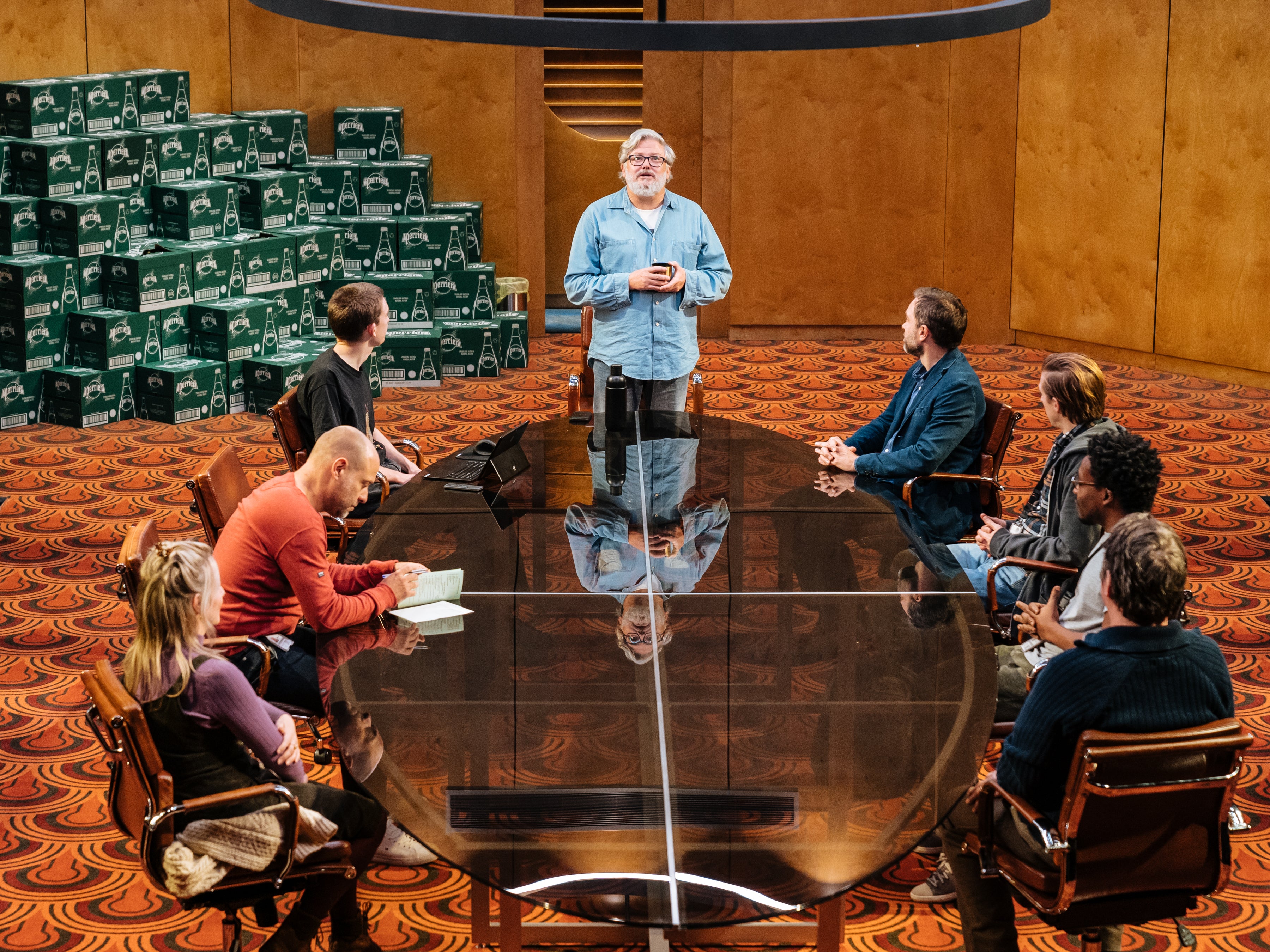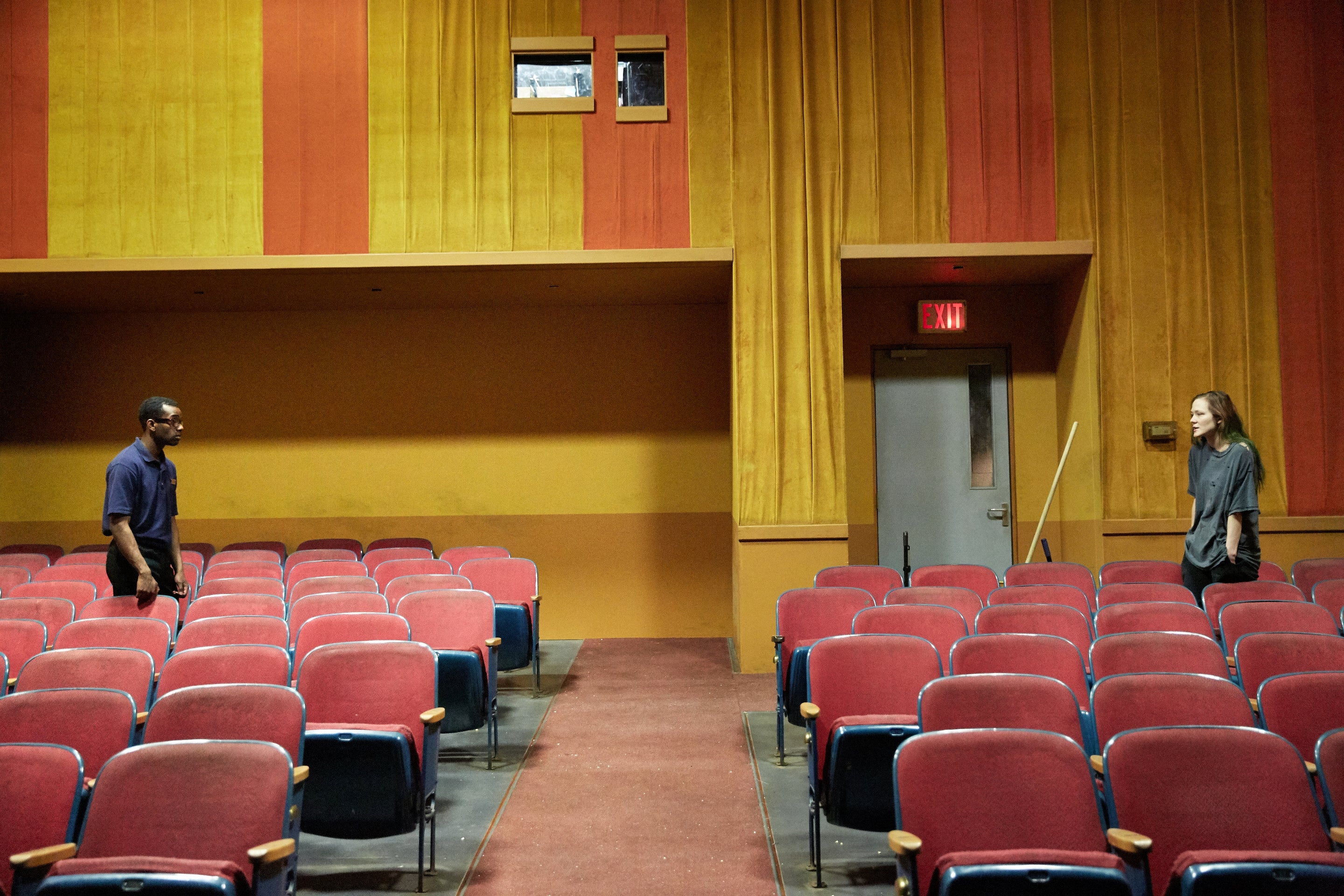Pauses, pain and the Pulitzer: How Annie Baker became the world’s coolest living playwright
Her three-hour play ‘The Flick’, about downtrodden ushers at a failing cinema, won Annie Baker the Pulitzer Prize and an ardent following of admirers. In a rare interview, she talks to Andrzej Lukowski about avoiding the spotlight, how being in physical pain inspired her new play ‘Infinite Life’, and why Brad Pitt would never be cast in her work

I wish I was one of those people who was comfortable with, like, a 45-second pause,” sighs playwright Annie Baker during a break from rehearsals at the National Theatre.
It’s hard to work out if she’s joking. No writer since Pinter has been so associated with pauses as Baker, and certainly none have been so acclaimed for it: her astonishing, Pulitzer Prize-winning breakthrough play The Flick – about a trio of ushers at a failing movie theatre – was a relatively conventional comedy on paper, but felt like some sort of cosmic trip in performance thanks to its gargantuan three-hour runtime, around half of which was silence.
She was feted more or less from the get-go: as a twentysomething she scored glowing reviews for her low-key, beautifully observed comedies set in smalltown Vermont. Two of those – The Aliens and Circle Mirror Transformation – made it over here, where they were warmly received. The Flick, however, changed everything. While somewhat divisive – not everyone wants to sit through a three-hour play that’s 50 per cent silence – it was the moment when people started to seriously discuss her as a contender for America’s greatest writer. Follow-up plays John and The Antipodes were flat-out astonishing, retaining the dry humour of her early work but adding wild metaphysical flourishes that thrillingly expanded her palette to include shades of everyone from Caryl Churchill to HP Lovecraft.
Toss in her dogged refusal to allow her work to be commercialised (more of which later) and some undeniably juicy family connections – she’s married to and has a daughter with academic Nico Baumbach, brother to Noah Baumbach, which means Greta Gerwig is her brother-in-law’s partner – and she’s at the very least a strong contender for the world’s coolest playwright.
She also hardly ever does face-to-face interviews, preferring to communicate via email. I’d wondered if it was a case of her being as awkward as some of her characters. But no: apparently she just can’t abide a pause and worries she just spouts nonsense in interviews. “I’m a people pleaser,” she explains, “and in the past, I’ve just said things I don’t mean at all out of eagerness to be a good subject and just say something.”
She agreed to do this one because she got her arm twisted to talk to a US publication earlier this year and found the experience surprisingly agreeable. Tall, with an auburn fringe and pale blue eyes, she’s intellectual in a thoughtful, friendly way. She seems genuinely at ease, too, though also comfortable shutting down certain questions, often with an indication she’d answer – but not on record. Much of what she says perhaps reads a little po-facedly, but her words are tinged with the same wryness as those of the characters in her plays, and she has a light, breezy voice – she gives the air of somebody who is more brutally honest about herself than somebody who takes herself desperately seriously.
Pauses, though. Baker is to this day bemused by the fact that the pauses in one play have turned into a reputation. “It became known as like a thing I did, which I found odd.” She points out that the silences in The Flick aren’t meant to be weird, but reflective of the fact that people don’t always talk while they’re working: “It’s a play about cleaning, not about pauses.”

One suspects that part of the issue is that, after The Flick, her plays became harder to describe. John was a drama about a troubled young couple staying at a chintzy, possibly haunted B&B near an American Civil War battlefield. The Antipodes followed a group of people seemingly trapped in an endless pitching session. Both were created very specific worlds that were superficially mundane, but steeped in the metaphysical.
Like a younger, funnier American cousin to Pinter or Caryl Churchill, her works are drily witty but have come to suggest the unknowableness of human existence, the sense that our lives are essentially incomprehensible, that there is a universe beyond our perceptions that would probably send us mad if we ever saw it. The change in tone from her naturalistic early work feels momentous – what prompted it?
“While I was writing John I felt like a lot of plays I’d been seeing had gotten very literal,” she says, “in a way that was boring me. I think I’m always trying to figure out how to express my preoccupations in a way that feels theatrically original.”

Which brings us to Infinite Life, her fourth work to be staged at the National Theatre, which transfers to London from an off-Broadway run on a wave of rapturous reviews. Set at a residential clinic in northern California, it follows a group of older women who are enrolled on an unseen guru’s fasting-based courses in an effort to treat their various sources of chronic pain. As with all of Baker’s plays, it is droll and well-observed, but it also asks audaciously big questions, specifically about the nature of desire in a failing body. The New Yorker called it “exquisite”; The New York Times called it “a great new play [that] peeps at the greatest mysteries of life”.
It was inspired in part by Baker’s love of Thomas Mann’s sanatorium-set classic The Magic Mountain (“my favourite book”), but also a period she spent in terrible physical pain, in 2015 and 2016. She politely refuses to get into specifics, but is happy to discuss in the abstract.
I was in extreme pain for two years and was seeking to make meaning of it for myself in some way
“I was in extreme pain for two years”, she says “and I was, like, seeking to make meaning of it for myself in some way. I couldn’t write – you know, if you’re in a really terrible pain you can’t write – but I was just trying to figure out what to do with it.”
Although she undoubtedly has her detractors – her plays are challenging, and require you to meet them halfway – Baker is now widely regarded in theatrical and critical circles as one of the greatest English language playwrights alive today. She’s won the Pulitzer and was the recipient of a MacArthur Fellowship aka a “genius grant” ($625,000 over five years for being an “extraordinarily talented and creative individual” – most of the recipients are scientists but other playwrights to receive it include Lin-Manuel Miranda and Lynn Nottage).

Why, then, isn’t she actually more famous? Why have none of her plays ever run on Broadway (something that would make her eligible for the Tony Awards)? Why has her earlier work never been revived? Why is her steadiest source of income teaching playwriting (at the University of Texas at Austin), rather than the plays themselves? Why have no famous people even been in her works? Why over here has she only been seen at the National’s smallest theatre, the Dorfman, where they could clearly go into its bigger houses?
The reasons can almost entirely be traced back to Baker herself, and a dogged refusal to compromise her vision of plays that she wrote for small theatres and non-famous casts.
You can kind of picture a 42-year-old Arthur Miller or David Mamet kicking back with a beer and saying “yup, I’m America’s greatest living playwright.” This is not how Baker thinks: she does a play and then moves on, apparently trying her best not to think about it again: “I don’t reread my old plays because I think I’d find it unbearable,” she sighs.
Hence, no revivals, and absolutely no Broadway productions with a celebrity cast, which have been offered to her and which she has steadfastly turned down.
“Star casting just completely changes the aesthetic of the whole experience,” she shrugs. “It’s not a good or bad thing, but it feels totally at odds with what I’m trying to achieve.”

She’s not some outsider artist, shivering away in a garret because she refuses to make money. She’s a revered playwright who has boundaries, and pragmatically tops up her income by teaching. She comes across as a perfectly normal middle-aged mum in many respects.
But also, there’s undeniably something other about her: she doesn’t write plays about the things other playwrights do, she doesn’t act like other playwrights do.
Whether or not she’s a genius is between her and MacArthur – but there is nobody out there like her.
‘Infinite Life’ is at the Dorfman until 13 January






Join our commenting forum
Join thought-provoking conversations, follow other Independent readers and see their replies
Comments